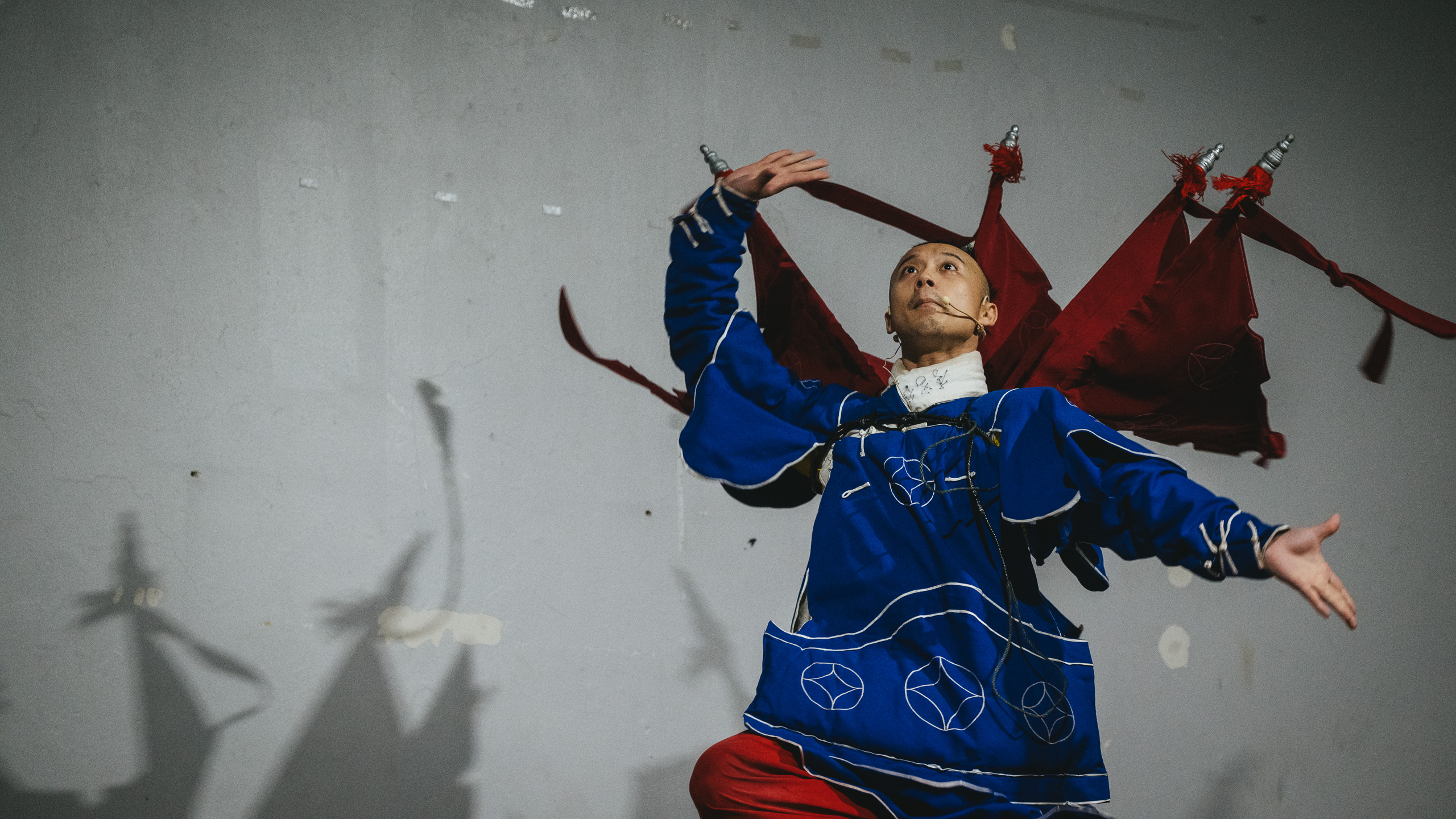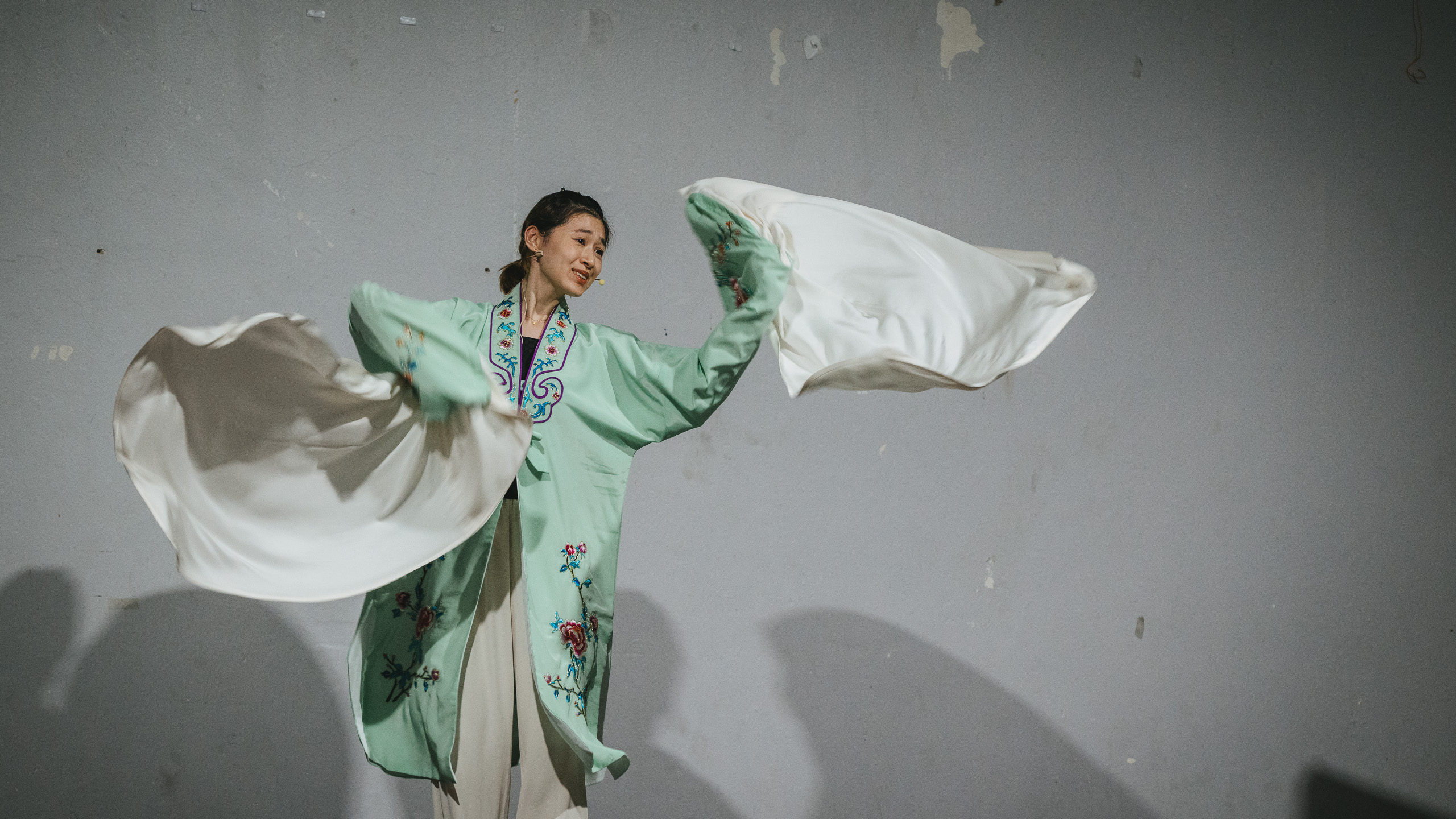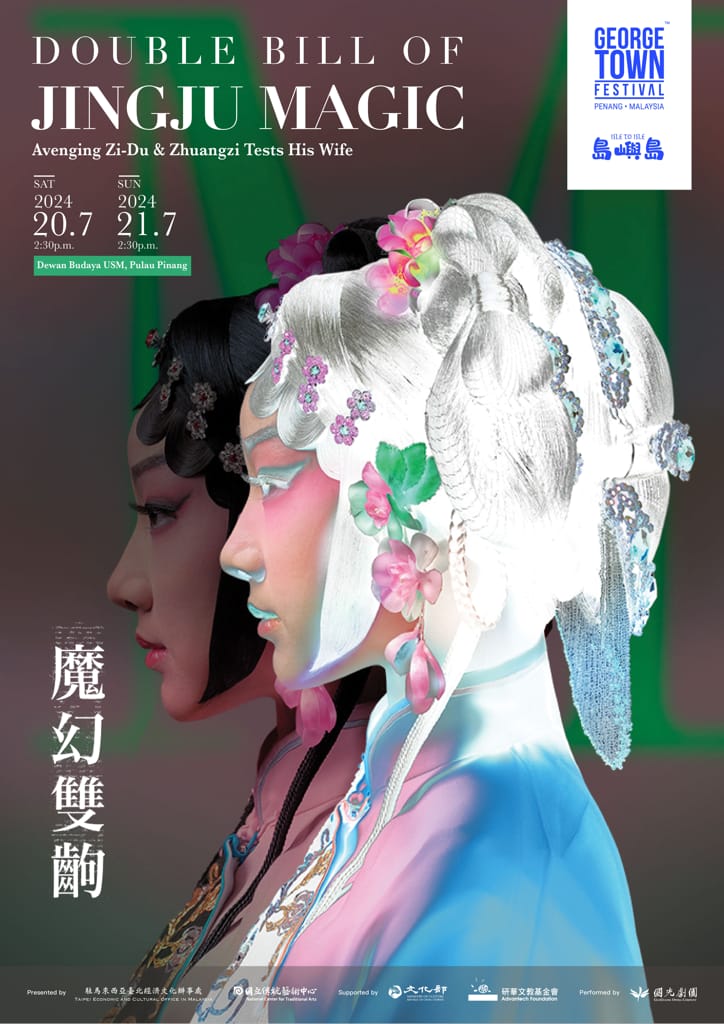Keeping the Curtain Open for Peking Opera
By Yee Heng Yeh
July 2024 FEATURE
“WHAT’S MOST IMPRESSIVE is that their physicality isn’t diminished at all, but in fact stands out as their strongest weapon,” Ling Tang exclaimed. “It’s like an intense 45-minute action movie right in front of you!”
You might have thought that the Artistic Director of George Town Festival (GTF) 2024 was referring to circus acrobats, or some high-wire act—but Ling was talking about Peking Opera, or jīng jù (京劇).
Last September, she had seen a few performances staged by GuoGuang Opera Company, Taiwan’s only national jīng jù troupe, and immediately became enthusiastic about bringing them to Malaysia. Having attended the talk and demo given by GuoGuang at the Penang Youth Centre, it was easy now for me to understand her enthusiasm.

Ancient Stories, Modern Times
Given its 200-year history, jīng jù is known as the “ocean that contains all rivers”, a moniker that speaks to its influence on subsequent genres of Chinese performing arts. In 2010, it was inscribed in UNESCO’s Representative List of the Intangible Cultural Heritage of Humanity.
GuoGuang Opera Company, formed in 1995, was the outcome of the historical development of jīng jù in Taiwan. Today, it is celebrated for its innovative approach of presenting the stories of traditional opera through a modern lens, alongside creating new scripts for performance. This allows GuoGuang to preserve traditional jīng jù conventions while evolving the art form, thereby ensuring its relevance to contemporary audiences—audiences not just in Taiwan, but also in Shanghai, Hong Kong, France, Russia, the Czech Republic and Singapore (with their last appearance in Malaysia in 2015, during the Kuala Lumpur International Arts Festival).
Much of GuoGuang’s success—attracting young crowds, selling out shows—have been attributed to this evolution, or what they term the “new aesthetics” of jīng jù.
For one, certain sensory details—like the costumes’ colours or the accompanying music—might be reimagined to better fit modern tastes. But besides what you see and hear, adaptation also occurs at the dramaturgical level. Chang Yu-hua, CEO of GuoGuang, notes that people often applaud the acrobatic performances in jīng jù, but feel alienated from the stories. So the challenge is to re-contextualise these classical tales for today’s world.
In this creative process, the artistic director (Wang An-chi, in this case) plays a crucial role, Chang explains. “The artistic director must be familiar with the traditional repertoires of jīng jù, which, as they’re passed down, will even have multiple editions.” In selecting which script to stage, they have to consider factors like the suitability of actors and the story’s appeal to the youth. “The artistic director would review the script and consider if any of its lyrics or ideas are no longer in line with current thinking,” Chang says.
For example, the original story of “Zhuangzi Tests His Wife” betrays a patriarchal basis: a philosopher fakes his death to test his wife’s fidelity—the tragic ending only confirms the morals involved, and is a critique of a woman who was just not “loyal enough”. GuoGuang’s version, however, departs from this vilification simply by giving voice to the wife, who talks about her relationship with her husband. This exploration of her inner psychology makes her more complex, which questions society’s skewed expectations of women. “We’d be able to understand why this woman, in that instant, could commit such a ‘deviant’ act—she has her own motivations,” Chang points out.
Sometimes, changes may be made for practical reasons. The script for “Avenging Zi-du” is pared down to four central characters—the generals Zi-du and Ying Kao-shu, and their stable boys, since the cast cannot be too big to accommodate their international tours. But the plot still charts Zi-du’s descent into madness; he is plagued by guilt after killing Ying out of jealousy (this thematic focus is why the play is known as the “Eastern Macbeth”). Flashbacks are also introduced to tighten the pacing, so now the play begins with a scene featuring the underworld judge—who promises a flashy entrance with pyrotechnics!
As with any endeavour to preserve tradition, it is all about striking a balance to ensure people do not lose sight of the purpose of these cultural inheritances— which are, in this case, the performance techniques themselves. “When we’re staging these stories, we retain the traditional performance elements as much as possible,” Chang says. “These techniques aren’t just technical skills; they affect how characters are brought to life onstage. This is what needs to be preserved in traditional jīng jù.”
An Actor-Oriented Art
The magic of jīng jù thus lies with the performers, who shoulder the burden of evoking different spaces and landscapes using just their bodies—after all, the typical jīng jù stage features minimalistic sets and lighting. During the demo, the audience got a taste of the Four Skills of jīng jù: singing, reciting, physical acting and martial arts, courtesy of performers Li Jia-de (who plays the Wusheng, or male martial arts, role) and Lin Ting-yu (who plays the Dan, or female, role). The demonstrations were simple but educational, enthralling the crowd who cheered and applauded at all the right moments.
These skills do not just serve to impress. Sometimes, they ensure the performer’s safety during a dangerous move. In a fainting movement to portray death or shock, the actors follow specific steps to minimise the impact of the fall: first, arching backwards, then bending the knees, before dropping to the floor.
Just as crucially, these techniques convey specific details about a character, so that audiences immediately grasp their role and social status just by the way they move. A warrior needs to have the appropriate energy and posture, whereas a noblewoman only glides across the stage in small, deliberate steps. The simple act of stepping through a doorway, or straightening one’s clothes, becomes a series of choreographed gestures. Even a calculated glance can serve to direct the audience’s attention.
The costumes are not just ornamental, but a vital communication tool for the performers. The fluttering pennants and skirts of the Wusheng magnify each twist of the shoulders and each high kick, whereas the water sleeves, when manipulated masterfully, create varying shapes and lines in the air, signifying grace, anger, joy or pain. All this, combined with the performers’ stylised actions, create clear characters who are larger than life, discernible even to an audience member sitting in the back row.
Such feats can only be accomplished after years of dedicated training, and the performers, like athletes, must train every day, sometimes up to eight hours. Lin noted that the most challenging aspect of this role is the ability to persevere. “The journey of learning will never stop,” she says. “The more you know, the more there is for you to learn. So each time you’re faced with this, you have to persist and try to break through.”
Carrying on the Legacy
Both Li and Lin are graduates of the National Taiwan College of Performing Arts, and are now award-winning jīng jù performers. Incidentally, neither of them ever intended to embark on this path as a kid.
“They lied to me, saying if I joined, I wouldn’t have to study! So I joined, only to discover that not not only did I have to study, I also had to train,” Lin recalls, laughing. “As I grew older, I started liking jīng jù more—maybe also because I had good teachers who inspired my love for jīng jù.” Li only became involved in jīng jù later through the fact that his martial arts teacher was also a jīng jù teacher.
Evidently, education is an important link in the preservation of this art, and the next generation always has to be actively nurtured. Therefore, GuoGuang has dedicated itself to revitalising jīng jù for nearly three decades. Chang explains that to develop young talents, Guoguang allows them to play leading roles. “This differs from how it was in the traditional troupes of the past—whoever was more senior would mostly take the lead roles.”
GuoGuang has also spearheaded programmes to expose jīng jù to young students, corporate circles and audiences abroad. This talk and demo, Chang points out, is one such example of outreach, providing the local audience with a framework for approaching jīng jù.
In the same vein, Chang is big on the use of surtitles, emphasising that it too is part of the stage’s aesthetics—though it has to be well coordinated to avoid becoming a distraction. “Once, after a show, an audience member said that our surtitles seemed to mirror the actors’ every breath.”
When it comes to sharing jīng jù across cultural borders, these are some of the challenges. But Chang is optimistic. “In terms of getting an international audience, I think as long as you’re taking the right steps to promote it strategically, it won’t be too difficult to bring people into the theatre.”

Yee Heng Yeh

is a writer and Mandarin-to-English translator whose work has been featured in The KITA! Podcast, adda, Strange Horizons, NutMag, Nashville Review and Guernica. You can find him on Twitter at @ HengYeh42.



